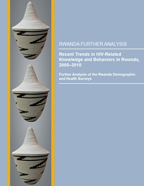
Abstract:
Using data from the two recent Rwanda
Demographic and Health Surveys, implemented
in 2005 and 2010, this study examined changes
in key HIV-related knowledge, attitudes, and
sexual behavior indicators. The study
revealed that there is some improvement in
HIV/AIDS-related knowledge, attitudes, and
sexual behavior, indicating that HIV/AIDS
prevention programs in Rwanda are in fact
having the desirable effects. Knowledge of
using condoms as an HIV prevention method has
increased in recent years. At the same time
there has been a considerable increase in
condom use during last sex and during last
non-spousal sex; nevertheless, the level of
condom use has remained low. There has also
been an increase in the proportion of men and
women who know that HIV can be transmitted
from mother to child, and that transmission
can be reduced increased significantly.
The initiation of sexual debut of youth under
age 15 remained low, and declined among men.
The proportion of young adults practicing
sexual abstinence (six out of ten) remained
unchanged. However, there has been some
deterioration in other indicators, such as an
increase in the proportion of adults with
multiple sex partners, the proportion of men
who ever paid for sex, and the proportion of
adults with STIs and STI symptoms. Changes in
HIV-related knowledge, attitudes, and sexual
behavior indicators in Rwanda between 2005
and 2010 are bidirectional. They indicate a
need for intensified efforts from HIV
programs to target certain sexual behaviors.
 Recent Trends in HIV-Related Knowledge and Behaviors in Rwanda, 2005-2010 (PDF, 617K)
Recent Trends in HIV-Related Knowledge and Behaviors in Rwanda, 2005-2010 (PDF, 617K)
